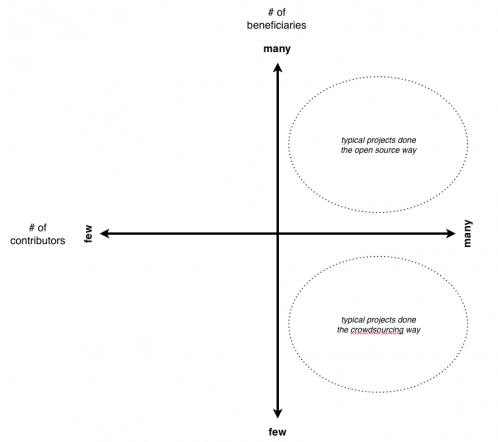
On Friday, Counterpoint, the British Council’s Thinktank held a conference in London to mark the tercentenary of the Statute of Anne, the first piece of legislation on copyright. I was one of the two opening speakers. Here’s my script on “Getting back to first principles”.
………………………….
When I think about this stuff, two images come to mind.
The first was conjured up by a fellow-countryman of mine in 1726. This is how he tells it:
“I was extremely tired, and with that, and the heat of the weather, and about half a pint of brandy that I drank as I left the ship, I found myself much inclined to sleep. I lay down on the grass, which was very short and soft, where I slept sounder than ever I remembered to have done in my life, and, as I reckoned, about nine hours; for when I awaked, it was just daylight. I attempted to rise, but was not able to stir: for, as I happened to lie on my back, I found my arms and legs were strongly fastened on each side to the ground; and my hair, which was long and thick, tied down in the same manner. I likewise felt several slender ligatures across my body, from my armpits to my thighs. I could only look upwards; the sun began to grow hot, and the light offended my eyes. I heard a confused noise about me; but in the posture I lay, could see nothing except the sky. In a little time I felt something alive moving on my left leg, which advancing gently forward over my breast, came almost up to my chin; when, bending my eyes downwards as much as I could, I perceived it to be a human creature not six inches high, with a bow and arrow in his hands, and a quiver at his back. In the mean time, I felt at least forty more of the same kind (as I conjectured) following the first. I was in the utmost astonishment, and roared so loud, that they all ran back in a fright; and some of them, as I was afterwards told, were hurt with the falls they got by leaping from my sides upon the ground.”
This is Jonathan Swift’s Gulliver, on the first of his celebrated travels.
The second image comes from Joseph Tainter’s intriguing book The Collapse of Complex Societies, in which he examined a number of sophisticated civilisations that flourished for aeons and then suddenly collapsed: these civilisations included those of the Romans, the Lowlands Maya and the Chacoans. Each of these societies had impressively complex social structures and very advanced technology, and yet, despite this, they collapsed, impoverishing and scattering their citizens and leaving little behind. How, Tainter asked, did this happen?
His answer was that they hadn’t collapsed despite their cultural sophistication, but because of it. Tainter’s account describes societies which, through a combination of social organization and environmental luck, find themselves with a surplus of resources. Managing this surplus makes each society more complex, and for a time the marginal value of this complexity is positive: each additional bit of complexity more than pays for itself in improved output. But over time, the law of diminishing returns reduces the marginal value, until it disappears completely. At this point, any additional complexity is pure cost. “Tainter’s thesis”, as Clay Shirky’s useful summary puts it, “is that when society’s elite members add one layer of bureaucracy or demand one tribute too many, they end up extracting all the value from their environment it is possible to extract –and then some”.
***
What have these two images to do with intellectual property?
Well, first of all, the Internet is our Gulliver, and the pygmies crawling about him are IP lawyers and their corporate clients.
My generation was lucky enough – or maybe smart enough, it doesn’t matter — to invent something magical: a gigantic, global machine for springing surprises. Or, to put it more prosaically, a network for enabling disruptive innovation. The architecture of the TCP/IP-based Internet with its lack of central control and its neutrality towards applications has stimulated an astonishing wave of creativity in the decades since it was switched on in January 1983. Among the surprises sprung by the network to date have been: email, the World Wide Web, streaming media, peer-to-peer networking, cloud computing, VoIP, blogging, Flickr, social networking and powerful search engines. These innovations have transformed our information environment, to the point where life without them has become inconceivable.
The arrival of this unruly giant on our Lilliputian shores, however, caused panic in many quarters, particularly in those which had hitherto made a good living out of the status quo. And their response to it – as evidenced most recently, for example, in the undignified scramble to pass the Digital Economy Act in the dying hours of a Parliament – has been to attempt to immobilise the giant by binding it with billions of silken threads, woven by IP lawyers, in the hope that it can be rendered impotent and life can go back to the status quo ante.
But if we allow that to happen then we’re done for. Capitalism needs explosive innovation: that’s the source of its dynamism. It can’t get by on the cosy incrementalism of old business models. We desperately need Joseph Schumpeter’s waves of creative destruction if we’re to feed our exploding global population, provide citizens with health care and develop technologies which might arrest and eventually reverse global warming. But we’re stuck with an Intellectual Property regime that was shaped by old communications technology and the special interests that grew up around it, and is increasingly a barrier to innovation rather than an incentiviser of it.
Which brings me to Tainter, and his gloomy thesis about collapse. As many of today’s contributors have pointed out, our existing IP regime is increasingly hindering creativity rather than facilitating it. The content industries would dearly love to extend this regime to cover everything that goes on in the networked world. If they succeed it will be, in my view, the step too far that Tainter observed in the societies that he studied. And those who recommend it will find that, far from extracting even more value from the system for their shareholders, they may just choke it to death.
My fear is that this is what will, in fact happen. Our situation is now one best described by the theory of incompetent systems – that is to say systems that can’t fix themselves because the components which need to change are driven by short-term considerations and are unable to think longer-term. Global warming belongs in the same category.
***
But perhaps this is too gloomy a thought to stomach on such a bright Spring morning. So let’s make an effort to be optimistic. If, by some miracle, we actually were able to muster the collective resolve to do something about our plight before it is too late, what should we do? To what First Principles should we return?
Historically, our approach to IP is that it has been too much couched in terms of particular communications technologies – print, records, movies, broadcast, and so on. If we were to have the opportunity to redesign the system then we should escape from these shackles; we should formulate the design in terms of general principles rather than particular instantiations of transient technologies. Among other things, this would involve:
Explicit recognition that an IPR is not a presumptively absolute right but a temporary, conditional monopoly granted by society.
A default assumption that any creative product is in the public domain unless the creator explicitly asserts ownership of his or her rights.
A globally-agreed definition of ‘fair use’ that emphasises its status as a condition of the grant of a temporary grant of monopoly and not a privilege grudgingly granted by rights holders.
A return to a legislative philosophy which decides copyright duration by balancing the need to incentivise innovators with society’s need for unrestricted access to creative outputs. This implies: (i) an obligation on legislators to seek objective assessments of the public interest in the context of any requests to extend IPRs; (ii) that appropriate durations may be different for different forms of expression: (iii) that durations should be regularly reviewed and adjusted to match changing circumstances; and that lawmaking on intellectual property should be strictly evidence-based in the way that legislating on e.g. pharmaceutical products is. Rights holders petitioning for extensions of their temporary monopolies would be required to provide evidence that the proposed extensions would lead to increased innovation or some other tangible public benefit.
The copyright system should be redesigned to be efficient in the sense that it is easy to identify rights holders.
Strict liability should be abolished. Penalties for inadvertent infringement should be proportional to the actual losses suffered by rights-holders, and in the event of disputes compensation should be determined by independent arbitration.
None of this is rocket science. These principles seem to me to be patently obvious, if you’ll excuse the pun. Some of them were obvious in 1710, and many were understood – and extensively discussed — by the framers of the US Constitution in the 1780s. Yet over the intervening 300 years we appear to have forgotten many of them. It’d be nice to think that we can begin learning from our mistakes. But I wouldn’t bet on it.



